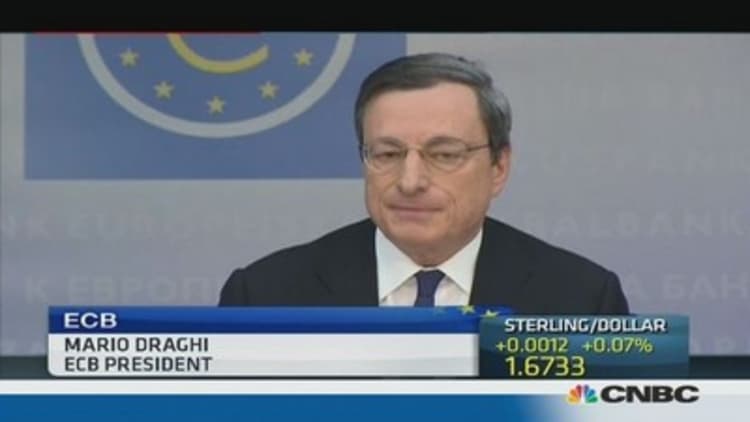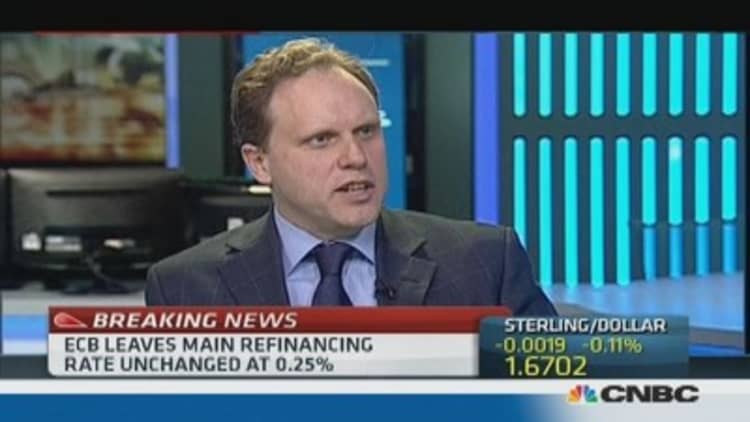
The European Central Bank (ECB) upped its growth forecast for 2014 on Thursday, sending the euro higher, but downgraded its outlook for inflation.
Speaking at his monthly press conference, ECB President Mario Draghi predicted the euro zone economy would grow by 1.2 percent this year. This was better than the 1.1 percent growth forecast issued by the central bank at the end of last year.
"The ongoing recovery is expected to proceed, albeit it at a slow pace," Draghi told journalists in Frankfurt, Germany. He reiterated that risks to the euro area remained "to the downside."
Growth in 2015 and 2016 is seen at 1.5 percent and 1.8 percent respectively.
Draghi downgraded the ECB's inflation outlook for 2014 to 1.0 percent, from the 1.1 percent forecast at the end of last year — well below the central bank's targeted level of "close to" 2 percent.
He reiterated that the euro zone was facing a "prolonged period of low inflation", but declined comparisons with Japan, which suffered deflation during the 1990s.
"We believe the situation is different," Draghi told reporters, saying that the ECB differed from the Bank of Japan in that it had taken "early decisive action" to tackle economic stagnation.
He added that consumer demand in the euro zone was boosted by low energy prices, and that bank and company balance sheets were better in the area than they were in Japan during its "lost decade".
The euro jumped above $1.38 after Draghi's comments, before falling back slightly. European stocks were broadly unchanged.
Earlier during the day, the ECB announced that it would leave its benchmark rate unchanged at record low of 0.25 percent on Thursday, in line with analyst expectations.

Speaking after the rate announcement, Daniel Lacalle of Ecofin forecast the euro would continue to strengthen.
"I think it (holding rates steady) gives a bit more time for the ECB to look at how the economy recovery pans out, especially into the very important second quarter of 2014," he told CNBC.
BoE acts as expected
The Bank of England (BoE) also left interest rates at a record low of 0.5 percent and its gilt purchase target unchanged at £375 billion ($617 billion), as expected.
(Read more: 'Too much focus' on rate hike: BoE's Broadbent)
The central bank also announced it would reinvest £8.1 billion ($13.5 billion) of cash flows from its asset purchases, focusing on gilts maturing on March 10.
Yields on benchmark 10-year U.K gilts were relatively unchanged after the announcement, holding steady at 2.751 percent. Sterling showed a small spike against the dollar after the news, ticking higher to $1.674 before falling back down to $1.671.
Analysts attributed sterling's gain to the reinvestment announcement rather than the decision to leave rates unchanged. The latter had been widely anticipated, with all 64 economists polled by Reuters this week forecasting no change of monetary policy by the BoE.
(Read more: Five years on: what 0.5% rate has meant for the UK)
"The decision to leave rates unchanged came as no surprise – while unemployment is falling and there are some signs of growth broadening into investment, we are yet to see an improvement in real wages," said Andrew Goodwin, a senior economic adviser at the EY ITEM Club.
"The U.K. economy remains fragile, and raising rates prematurely could put a stick in the spokes of the recovery. Meanwhile, inflation remains in check, leaving the MPC (Monetary Policy Committee) room to focus on supporting growth."
Follow us on Twitter: @CNBCWorld



